Harris and Trump in North Carolina: Two rallies, two parallel universes
The speeches delivered by the U.S. presidential candidates in the same state on the same day underscore the stark contrast between their visions for the country, in a campaign characterized by confrontation, deep mistrust and palpable anxiety
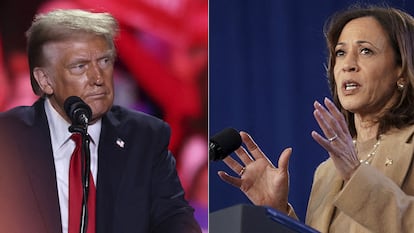
Much like flocks of birds that draw near and drift apart without ever touching, the campaigns of Donald Trump and Kamala Harris have been tracing a zigzag across the seven swing states in the U.S. elections, as the two rally supporters and seek that elusive prize: the undecided voter, an electoral unicorn.
In the final week of the campaign, these dual paths to the White House intensified. On Saturday, they nearly intersected in North Carolina, one of the battlegrounds for what may be one of the closest elections in modern U.S. history. The moment unfolded in the afternoon as Harris descended the stairs of Air Force Two upon landing in Charlotte, the state’s most populous city. Just 100 meters away stood Trump Force One, her rival’s imposing aircraft. The Democratic candidate kept her eyes fixed on the tarmac, deliberately avoiding the sight of her opponent’s name emblazoned in bold letters across the fuselage of the Boeing 757.

Following that brief non-encounter, the dialogue of the deaf between the two candidates — and by extension, the two Americas — could resume. Each retreated into their respective parallel universes, just three days before the election on Tuesday, when voters will cast a ballot for more than just who they want to be the next president; they will be deciding what kind of society they want to live in. On one side, a vision aspiring to reclaim a past greatness that may have never existed; on the other, a vision eager to forge a future that many fear may will leave them out.
Hours later, EL PAÍS attended two of the last rallies before Election Day, which unfolded partly in tandem like a split-screen broadcast. Harris spoke in Charlotte while Trump rallied in Greensboro, two southern cities separated by 93 miles. They may just be two of the dozens of campaign events each candidate had held since September (Harris has held 85; Trump 97), but they served to highlight the stark contrast between their two campaigns in the final stretch of an election cycle marked by confrontation, mistrust, and anxiety.
For Trump — who began and ended the day in North Carolina with a stop in Salem, Virginia — the United States will be the perfect country once his so-called rescue mission is complete. Addressing supporters late in the evening at a sports stadium in the state’s third-largest city, with a crowd brandishing signs declaring “Trump will fix it,” he laid out his promises: reducing inflation, closing the border with Mexico, executing the largest mass deportation in history, securing world peace single-handedly, and reforming the electoral system to restrict voting to in-person ballots on a single day — the day of the election.
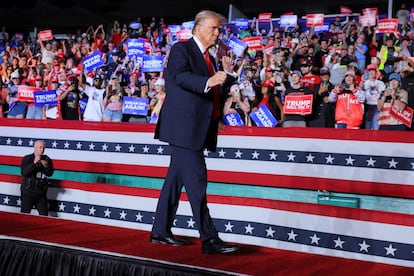
Harris, speaking at an open-air amphitheater near Charlotte after an earlier appearance in Atlanta, Georgia — another key battleground state — envisioned a happy nation, capable of moving beyond the confrontational climate of recent years, as if that were a simple task. Unlike Trump, whom she described as “unstable, obsessed with revenge, consumed by grievance, and out for unchecked power,” Harris reiterated her stance in front of a backdrop bearing the slogan “President for all.” She emphasized that she does not intend to step into the Oval Office with “an enemies list” but with a “to-do list,” which she outlined: reducing the cost of living, cutting taxes for 100 million middle-class Americans, raising taxes on large corporations and the wealthiest individuals, and ensuring healthcare as “a right, not a privilege.” “The future of our country is bright,” she added. “You just have to see it in front of you.”
Enthusiasm for Trump and Harris
The promises from both candidates were met with similar enthusiasm in Greensboro and Charlotte. If there is one sentiment shared by supporters from both camps, it is their fervent devotion to their respective leaders and, in these final campaign days, the conviction (or perhaps false hope) that their side will prevail on Election Day. Both groups also share a sense of foreboding, predicting there will be disaster if the other side wins, albeit with different interpretations of the potential fallout. “Democracy will be in danger if that arsonist wins,” said Maggie Macomber, a Harris supporter. “It will be the start of a damn civil war if the election is stolen from us,” warned Wyatt Rike, who, after retiring, discovered a passion for selling merchandise at Trump rallies.
Saturday was another profitable day for Rike’s business in Greensboro. Thousands of Trump supporters, largely white men, women, and children, gathered in the predominantly African-American city hours ahead of time, as is customary. One young man, boasting of his dedication, said he had been waiting since the night before, driven by “the satisfaction of being first in line.”
Debbie Boyce, who came with her son and a toy skeleton she called Gary, predicted that the Republican candidate “will win overwhelmingly on Tuesday.” Meanwhile, DeAndre Jones, an African-American man who has been attending Trump rallies since he was 14 — this week marking his fourth event alone — offered a perspective that defied the stereotype of the ill-informed MAGA supporter. He voted early for Trump, citing his reasons as Trump’s hardline immigration stance, aimed at preventing the U.S. from changing “forever and irremediably,” his pledge to dismantle federal power and return it to the states, his inclination toward economic libertarianism, and the promise to include figures like Elon Musk, Rand Paul, and Robert F. Kennedy in his Cabinet if re-elected.
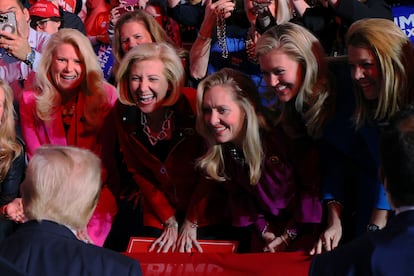
Outside the Democratic rally — which began ahead of schedule and, according to campaign estimates, drew a crowd of 10,000 — supporters like Laquana Harris, a 49-year-old African-American woman, gathered with hope. She attended because she believes Harris will defend “women’s rights, affordable housing, the job market, and income.” Nelson Gutiérrez, a New Yorker of Puerto Rican descent, said he was moved by the “disgusting” slurs at Trump’s Madison Square Garden rally, where a comedian disparaged his ancestral homeland as “a floating island of garbage.” “We must remember that although he now seeks our vote, he once refused to rent apartments to Hispanics or minorities in his apartment blocks,” Gutiérrez recalled.
The scenes that followed their patient wait could not have been more contrasting. Harris’s speech, held earlier than planned, was concise, lasting under 25 minutes and closely adhering to her script. In stark contrast, Trump’s event was an improvised 1980s-style spectacle that started nearly two hours late — the likely consequence of scheduling three long rallies in a single day. Where Harris had the support of famous allies, such as rock star Jon Bon Jovi and actress Kerry Washington, Trump’s rally was a solo performance centered entirely on him.
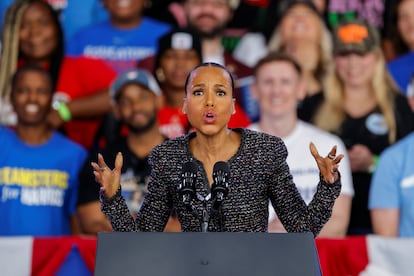
Anything less would have disappointed Trump’s supporters, a devoted group united by their hatred for Democrats and their reverence for an unfiltered, audacious leader. Trump’s relationship with his followers is one that few could replicate. In Greensboro, many dressed in costumes made from garbage bags or donned bright orange safety vests of cleaning staff — just as Trump did after President Joe Biden referred to the Republican supporters as “garbage.”
Arriving visibly fatigued, Trump opened the event with a familiar nod to “the beautiful women from North Carolina,” a group of evangelical Christian supporters who regularly follow him to rallies. “I think it’s like 251 rallies they’ve been to. They’re all happily married, but I have never see their husbands,” he joked. At one point, when he speculated about whether Harris really worked at McDonald’s as a young woman, a man in the crowd shouted that she worked “on a corner” (implying prostitution). Trump chuckled, pointed at the man, shook his head, and remarked, “This place is incredible,” before adding, “Remember, that’s what someone else said, not me.” He also labeled Harris as “an idiot,” “a liar,” and claimed she had an IQ of 70, a figure near the lowest range.
The crowd didn’t just laugh at Trump’s quips; they also booed the media when he attacked them, applauded his bold claims and far-fetched promises — like constructing an “anti-missile iron dome” for the U.S., modeled after Israel’s — and ignored even the most glaring falsehoods, such as when he asserted that the stadium was packed despite rows of empty seats. The greatest applause came during his discussion of the economy, marked by trademark exaggeration.
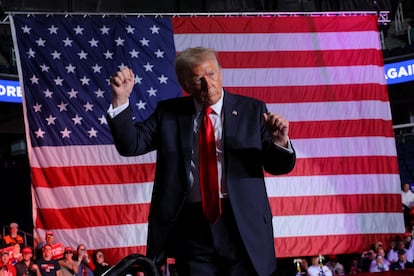
Trump's apocalyptic vision
The candidate leveraged skewed job creation data from September — a month that saw only 12,000 new jobs, impacted by the Boeing strike and hurricanes Helene and Milton — to bolster his dire economic narrative. He described these as “the worst numbers” in history, ignoring the fact that during his own administration, and amid the pandemic, there was a month in which 20.5 million jobs were destroyed. Trump also vowed to “end inflation very quickly,” conveniently overlooking the significant groundwork already laid by the Federal Reserve, which has nearly stabilized prices, leaving little left for the next administration to manage.
Harris’ rhetoric, though less combative, sharpened in recent days, when she openly called Trump a “fascist.” While she maintains a more consistent relationship with the truth than her opponent, she insists that Trump plans to enact Project 2025, a deeply conservative program devised by a Washington think tank, from which Trump has distanced himself (he did so again in Greensboro).
The Democratic candidate said that Trump aims to implement a nationwide abortion ban, limit access to contraceptives, threaten the legality of in vitro fertilization (even though Trump has called himself “the father” of this medical practice), and force the states to monitor women’s pregnancies.
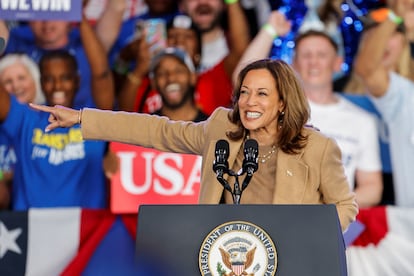
Harris is banking on these pivotal issues to secure the presidency, leaning heavily on the support of female voters in a campaign marked by an unprecedented gender gap. Meanwhile, Trump avoided discussing abortion — another sign of how these two parallel political universes are defined not only by their priorities but also by what they choose to sidestep. Harris, in turn, made no mention of illegal immigration, possibly the Democrats’ most vulnerable issue, or the destructive impact of Hurricane Helene, which had struck North Carolina. Trump did bring it up, reiterating some of the misleading claims he spread during those days.
International politics also made only a fleeting appearance at the Charlotte rally, which was interrupted three times by pro-Palestinian activists critical of the Biden administration’s support for Israel. Harris addressed the issue briefly, saying, “We all want that war in the Middle East to end. We want the hostages home. When I am president, I will do everything in my power to make it so.”
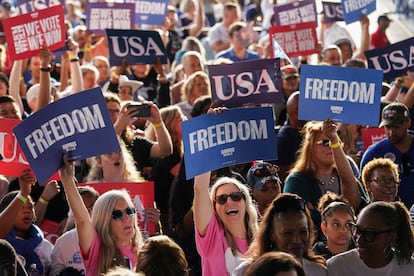
Throughout his meandering speech, which ended close to 11:00 p.m. — just in time for Harris’ appearance on Saturday Night Live — Trump highlighted the effort he was putting into the final campaign push. “Three rallies today, three tomorrow, and on Monday I’m going to do four rallies in one day,” he said, adding that he was “sad” that the campaign was coming to an end. He framed it as more than just an electoral race ending, but as the culmination of “the greatest political movement, probably in the history of the world.”
Trump also urged the audience to vote: “Please go and vote. If I don’t win after all this, I’m in trouble.” This sentiment was something the Republican and Democratic political universes could both agree on — not only in the context of the nation’s future but also for Trump personally. Having been found guilty of 34 felony counts, for which he is awaiting sentencing, and with three more trials pending, Trump’s fate hinges dramatically on the outcome of the election. If he does not take the oath at the Capitol as the 47th president of the United States on January 20, his future will look markedly different.
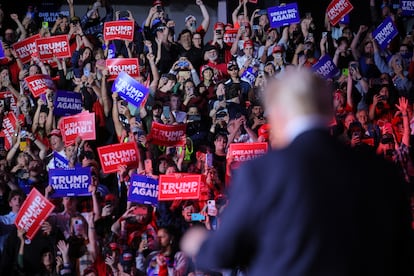
Sign up for our weekly newsletter to get more English-language news coverage from EL PAÍS USA Edition
Tu suscripción se está usando en otro dispositivo
¿Quieres añadir otro usuario a tu suscripción?
Si continúas leyendo en este dispositivo, no se podrá leer en el otro.
FlechaTu suscripción se está usando en otro dispositivo y solo puedes acceder a EL PAÍS desde un dispositivo a la vez.
Si quieres compartir tu cuenta, cambia tu suscripción a la modalidad Premium, así podrás añadir otro usuario. Cada uno accederá con su propia cuenta de email, lo que os permitirá personalizar vuestra experiencia en EL PAÍS.
¿Tienes una suscripción de empresa? Accede aquí para contratar más cuentas.
En el caso de no saber quién está usando tu cuenta, te recomendamos cambiar tu contraseña aquí.
Si decides continuar compartiendo tu cuenta, este mensaje se mostrará en tu dispositivo y en el de la otra persona que está usando tu cuenta de forma indefinida, afectando a tu experiencia de lectura. Puedes consultar aquí los términos y condiciones de la suscripción digital.








































